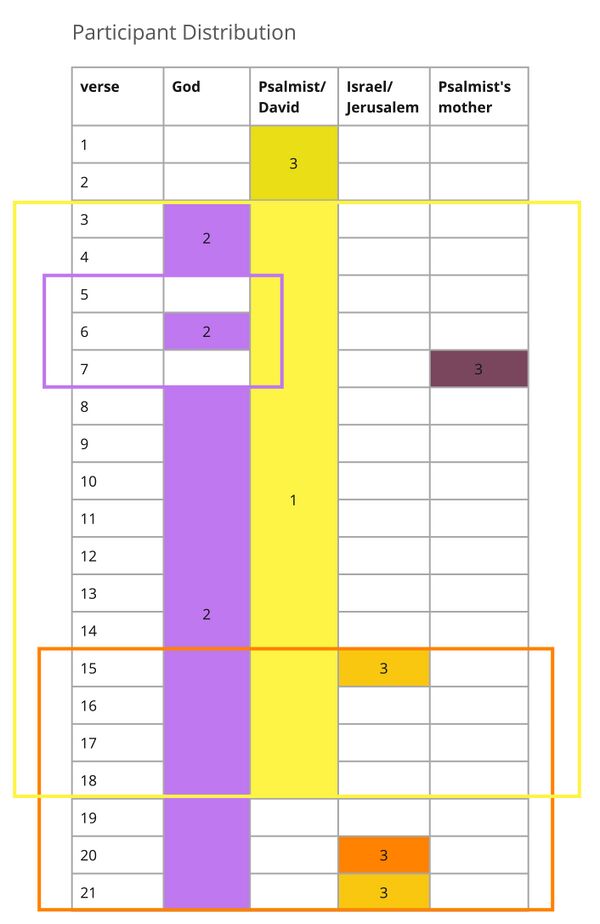Psalm 51 Participant Analysis
From Psalms: Layer by Layer
Psalm 51/Participant Analysis
Choose a PsalmNavigate Psalm 51
Guardian: Drew Longacre
Participant Analysis
Participant Analysis focuses on the characters in the psalm and asks, “Who are the main participants (or characters) in this psalm, and what are they saying or doing? It is often helpful for understanding literary structure, speaker identification, etc.
For a detailed explanation of our method, see the Participant Analysis Creator Guidelines.
There are # participants/characters in Psalm 51:
Profile List
| Psalmist/David |
| Psalmist's body |
| "bones" (v. 10) |
| "tongue" (v. 16) |
| "mouth" (v. 17) |
| God |
| "the God who saves me" (v. 16) |
| "Lord" (v. 17) |
| Israel |
| "sinners" (v. 15 |
| "transgressors" (v. 15) |
| "(people)" (v. 21) |
| Jerusalem |
| "Zion" (v. 20) |
| Psalmist's mother |
Profile Notes
- Psalmist / David: In Story Behind, we determined to treat David as the "I" of the psalm based on the traditional superscription. The psalmist also refers metonymically to himself when he speaks of his body in agentive terms.
- God: In the version of the psalm we have today (within the context of the Elohistic psalter), God is referred to as "God," "the God who saves me," and "Lord," but never YHWH.
- Israel and Jerusalem: The city Jerusalem/Zion is mentioned explicitly twice in v. 20 and may be understood to refer implicitly also to the people who inhabit the city or at least have it as their capital (= the people of Israel). Israel is never explicitly mentioned, but must be supposed by the impersonal verb יַעֲלוּ in v. 21. The "sinners" are only mentioned explicitly in v. 15, but they may also be implied as the threat in "Deliver me from bloodshed" in v. 16, depending on the interpretation of the situation in view. The text is not explicit whether these sinners are foreigners or Israelites, but their anticipated returning to the Lord suggests that these sinners constitute the restored faithful of Israel who offer right sacrifices in Jerusalem in v. 21. Thus, there seems to be an ironic blend/twist involved, where Israel and the sinners are one and the same participant, just at different points in time and in different roles (the faithless enemies become faithful worshippers). Just as David moves from sinner to restored worshipper, so also does the nation of Israel. The reference to "hearing" gladness and joy in v. 10 may also be an allusive reference to restored Israel in joyful corporate worship.
- Psalmist's mother: The psalmist's mother plays only a limited background role in v. 7 (and some interpret v. 8 as referring to the mother's womb), setting the context for the psalmist's pre-natal sinfulness.
| Hebrew | Line | English |
|---|---|---|
| לַמְנַצֵּ֗חַ מִזְמ֥וֹר לְדָוִֽד׃ | 1 | For the music director. A psalm. By David. |
| בְּֽבוֹא־אֵ֭לָיו נָתָ֣ן הַנָּבִ֑יא | 2a | When Nathan the prophet came to him, |
| כַּֽאֲשֶׁר־בָּ֝֗א אֶל־בַּת־שָֽׁבַע׃ | 2b | when he had had sexual intercourse with Bathsheba. |
| חָנֵּ֣נִי אֱלֹהִ֣ים כְּחַסְדֶּ֑ךָ | 3a | Show mercy to me, God, according to your loyalty; |
| כְּרֹ֥ב רַ֝חֲמֶ֗יךָ מְחֵ֣ה פְשָׁעָֽי׃ | 3b | according to your abundant compassion wipe away my transgressions. |
| הֶ֭רֶב כַּבְּסֵ֣נִי מֵעֲוֺנִ֑י | 4a | Wash me thoroughly from my iniquity, and cleanse me |
| וּֽמֵחַטָּאתִ֥י טַהֲרֵֽנִי׃ | 4b | my iniquity, and cleanse me from my sin, |
| כִּֽי־פְ֭שָׁעַי אֲנִ֣י אֵדָ֑ע | 5a | because I am [continually] aware of my transgressions, |
| וְחַטָּאתִ֖י נֶגְדִּ֣י תָמִֽיד׃ | 5b | and my sin is constantly in front of me. |
| לְךָ֤ לְבַדְּךָ֨ ׀ חָטָאתִי֮ | 6a | Against you alone I have sinned, and I have done what is evil in your |
| וְהָרַ֥ע בְּעֵינֶ֗יךָ עָ֫שִׂ֥יתִי | 6b | and I have done what is evil in your eyes, such that you are in the |
| לְ֭מַעַן תִּצְדַּ֥ק בְּדָבְרֶ֗ךָ | 6c | in your eyes, such that you are in the right whenever you speak, |
| תִּזְכֶּ֥ה בְשָׁפְטֶֽךָ׃ | 6d | in the right whenever you speak, [and such that] you are faultless whenever you judge. |
| הֵן־בְּעָו֥וֹן חוֹלָ֑לְתִּי | 7a | Look, I was born in iniquity, |
| וּ֝בְחֵ֗טְא יֶֽחֱמַ֥תְנִי אִמִּֽי׃ | 7b | and in guilt my mother conceived me. |
| הֵן־אֱ֭מֶת חָפַ֣צְתָּ בַטֻּח֑וֹת | 8a | Look, you desire truth in the covered places, |
| וּ֝בְסָתֻ֗ם חָכְמָ֥ה תוֹדִיעֵֽנִי׃ | 8b | and you make me know wisdom in the closed-off place. |
| תְּחַטְּאֵ֣נִי בְאֵז֣וֹב וְאֶטְהָ֑ר | 9a | purify me with hyssop, so that I will be clean; |
| תְּ֝כַבְּסֵ֗נִי וּמִשֶּׁ֥לֶג אַלְבִּֽין׃ | 9b | wash me, so that I will be whiter than snow. |
| תַּ֭שְׁמִיעֵנִי שָׂשׂ֣וֹן וְשִׂמְחָ֑ה | 10a | make me hear gladness and joy; |
| תָּ֝גֵ֗לְנָה עֲצָמ֥וֹת דִּכִּֽיתָ׃ | 10b | bones that you have crushed might rejoice. |
| הַסְתֵּ֣ר פָּ֭נֶיךָ מֵחֲטָאָ֑י | 11a | Hide your face from my sins, |
| וְֽכָל־עֲוֺ֖נֹתַ֣י מְחֵֽה׃ | 11b | and wipe away all my iniquities. |
| לֵ֣ב טָ֭הוֹר בְּרָא־לִ֣י אֱלֹהִ֑ים | 12a | Create a clean heart for me, God, |
| וְר֥וּחַ נָ֝כ֗וֹן חַדֵּ֥שׁ בְּקִרְבִּֽי׃ | 12b | and renew a steadfast spirit within me. |
| אַל־תַּשְׁלִיכֵ֥נִי מִלְּפָנֶ֑יךָ | 13a | not cast me away from before you, |
| וְר֥וּחַ קָ֝דְשְׁךָ֗ אַל־תִּקַּ֥ח מִמֶּֽנִּי׃ | 13b | from before you, and do not take your holy spirit away from me. |
| הָשִׁ֣יבָה לִּ֭י שְׂשׂ֣וֹן יִשְׁעֶ֑ךָ | 14a | Restore to me the gladness that results from your salvation, |
| וְר֖וּחַ נְדִיבָ֣ה תִסְמְכֵֽנִי׃ | 14b | and [would you please] support me with a willing spirit. |
| אֲלַמְּדָ֣ה פֹשְׁעִ֣ים דְּרָכֶ֑יךָ | 15a | I intend to teach transgressors your ways, |
| וְ֝חַטָּאִ֗ים אֵלֶ֥יךָ יָשֽׁוּבוּ׃ | 15b | to teach transgressors your ways, so that sinners will turn back to you. |
| הַצִּ֘ילֵ֤נִי מִדָּמִ֨ים ׀ אֱֽלֹהִ֗ים | 16a | Deliver me from bloodshed, God, the God who saves me, [so that] my |
| אֱלֹהֵ֥י תְּשׁוּעָתִ֑י | 16b | me from bloodshed, God, the God who saves me, |
| תְּרַנֵּ֥ן לְ֝שׁוֹנִ֗י צִדְקָתֶֽךָ׃ | 16c | tongue will shout for joy about your righteousness. |
| אֲ֭דֹנָי שְׂפָתַ֣י תִּפְתָּ֑ח | 17a | Lord, [would you please] open my lips, |
| וּ֝פִ֗י יַגִּ֥יד תְּהִלָּתֶֽךָ׃ | 17b | you please] open my lips, so that my mouth will report praise concerning you. |
| כִּ֤י ׀ לֹא־תַחְפֹּ֣ץ זֶ֣בַח וְאֶתֵּ֑נָה | 18a | For you do not delight in sacrifice[s], or else I would give |
| ע֝וֹלָ֗ה לֹ֣א תִרְצֶֽה׃ | 18b | you are not pleased with burnt offering[s]. |
| זִֽבְחֵ֣י אֱלֹהִים֮ ר֪וּחַ נִשְׁבָּ֫רָ֥ה | 19a | sacrifices [acceptable to] God are broken spirit[s]; |
| לֵב־נִשְׁבָּ֥ר וְנִדְכֶּ֑ה | 19b | a broken and crushed heart, |
| אֱ֝לֹהִ֗ים לֹ֣א תִבְזֶֽה׃ | 19c | God, you do not despise. |
| הֵיטִ֣יבָה בִ֭רְצוֹנְךָ אֶת־צִיּ֑וֹן | 20a | Do good to Zion in accord with what pleases you; |
| תִּ֝בְנֶ֗ה חוֹמ֥וֹת יְרוּשָׁלִָֽם׃ | 20b | build the walls of Jerusalem. |
| אָ֤ז תַּחְפֹּ֣ץ זִבְחֵי־צֶ֭דֶק עוֹלָ֣ה וְכָלִ֑יל | 21a | Then you will delight in right sacrifices, in burnt offering[s] and whole offering[s]; |
| אָ֤ז יַעֲל֖וּ עַל־מִזְבַּחֲךָ֣ פָרִֽים׃ | 21b | you will delight in right sacrifices, in burnt offering[s] and whole offering[s]; then [people] will offer up bulls on your altar. |
- v. 4. For the vocalization of the ketiv הַרְבֵּה, see grammar note on v. 4 (MT qere: הֶ֭רֶב).
- v. 6. For the revocalization of בְּדַבֵּרְךָ, see grammar note on v. 6 (MT: בְּדָבְרֶ֗ךָ).
- v. 8. For the revocalization of וּבַסָּתֻם, see grammar note on v. 8 (MT: וּ֝בְסָתֻ֗ם).
Notes
- vv. 5, 7. These are the only verses in the entire psalm where God does not appear as a participant. The textual absence of God may be iconic for his felt absence (or at least distance) due to the psalmist's sinfulness.
- vv. 15, 21. If the sinners mentioned in v. 15 are the faithful of restored Israel in v. 21, then vv. 15-21 begin and end with references to Israel.
- v. 16. For אֱלֹהֵי תְּשׁוּעָתִי, the entire phrase is an appellation for God, but the 1cs suffix within it refers to the psalmist.
- v. 20. According to Ross (2019), Jerusalem is a metonymic reference to David himself, but this seems both unwarranted and unparalleled.
Participant Relations Diagram
The relationships among the participants may be abstracted and summarized as follows:




